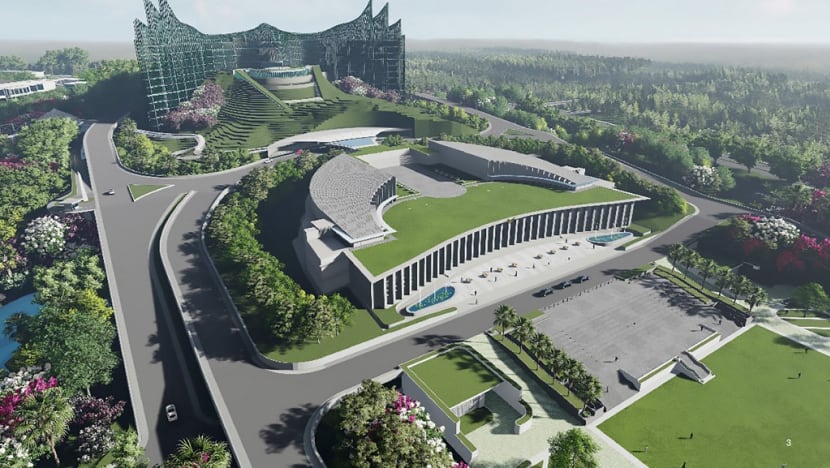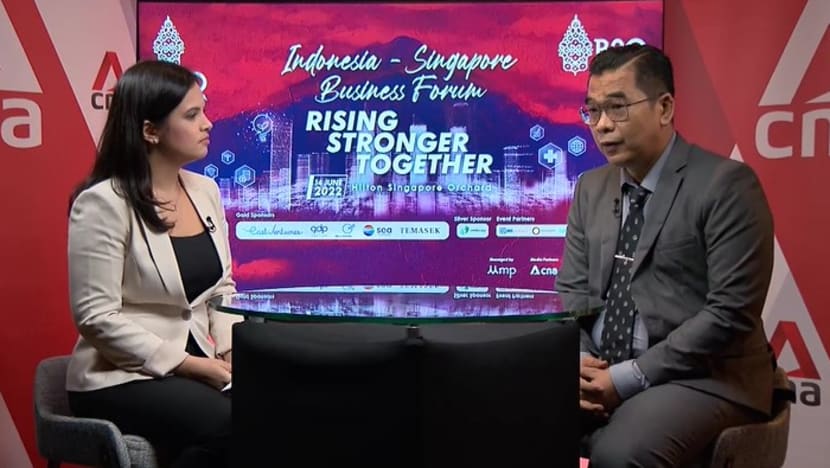Indonesia's new capital project will proceed, no matter 2024 election outcome: Senior Nusantara authority official
Prof Mohammed Ali Berawi says on-demand, driverless cars will ply the roads of Nusantara, which is envisioned to be a sustainable and smart city.

An illustration of Indonesia's future presidential palace in East Kalimantan. (Image: AFP/Nyoman Nuarta/Handout)
SINGAPORE: Indonesia’s new capital project is a priority goal that has been enshrined in the country’s law, said an official from the Nusantara Capital City Authority on Tuesday (Jun 14).
When asked how the 2024 election outcome might affect Nusantara’s development, Professor Mohammed Ali Berawi, the authority’s chairman for coordination of technology transformation and innovation, noted that the construction process has been planned until 2045.
“It’s not a single or short-term goal, we see it as a mid- and long-term goal.
“And this has been endorsed by the Act, the law of Indonesia, in which this will be one of the major priorities,” he told CNA in an exclusive interview.
Prof Berawi was speaking to CNA on the sidelines of the Indonesia-Singapore Business Forum held in Singapore.
“Because of the necessity of this new capital city, it will be continued until we achieve the selected target, the ultimate goal, which is to build a sustainable and inclusive city,” he said, adding that the city will be an economic generator not only for Indonesia, but also for the region and the world.
“That's why we believe that Nusantara will be a global city for all,” Prof Berawi said.
In 2019, President Joko Widodo announced that the country’s capital would move from Jakarta to the island of Borneo.
The move was deemed necessary to save sinking and congested Jakarta and to develop Kalimantan as well as the eastern part of Indonesia.
The Bill on capital relocation was signed into law on Feb 15 this year. The final stage of Nusantara’s construction is targeted to be completed by Indonesia’s centennial in 2045, when it aims to become an advanced nation.
About 60,000 civil servants will be relocated from Jakarta to Nusantara, and 200,000 workers are expected to be involved in the construction, said Prof Berawi.
Construction will begin in the second half of this year, with a target to complete the first phase in 2024, he added.

AUTONOMOUS VEHICLES AS BACKBONE OF PUBLIC TRANSPORTATION
Technology deployment and innovation will play significant roles in the development of Nusantara as a “forest city, sponge city and smart city”, according to Prof Berawi.
Sponge city is an urban construction model that absorbs and retains rainwater while reducing floods.
To be environmentally sustainable, Nusantara will feature autonomous vehicles as the backbone of its public transportation system, he added.
“We want to have an on-demand and dynamic route for driverless cars, rather than a fixed schedule bus system.
“We plan to invent this autonomous car in order to have safer, more efficient urban mobility, eliminating congestion and carbon emission as well as providing mobility to people with disabilities and special needs,” he said.
Stressing that the environmental, social and corporate governance (ESG) principles will be borne in mind while developing Nusantara, Prof Berawi said about 75 per cent of the new capital will comprise forests and green areas.
About 65 per cent of it will be tropical forests while another 10 per cent will be allocated to food supply resilience industries and others.
“By having this 75 per cent of tropical forests and green areas, we are going towards a carbon neutral city.
“Indeed, we can have this carbon negative city, which means that we absorb more carbon emission rather than emitting it. This is how we look at our future for the Nusantara new capital city development,” Prof Berawi added.














